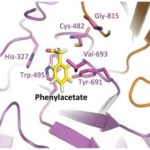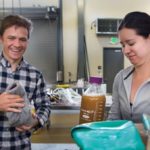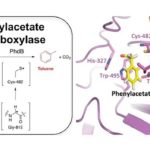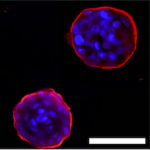 Researchers at the Department of Energy’s Joint BioEnergy Institute (JBEI) and Lawrence Berkeley National Laboratory (Berkeley Lab) have discovered a new enzyme that will enable microbial production of a renewable alternative to petroleum-based toluene, a widely used octane booster in gasoline that has a global market of twenty nine million tons per year.
Researchers at the Department of Energy’s Joint BioEnergy Institute (JBEI) and Lawrence Berkeley National Laboratory (Berkeley Lab) have discovered a new enzyme that will enable microbial production of a renewable alternative to petroleum-based toluene, a widely used octane booster in gasoline that has a global market of twenty nine million tons per year.
Nitric Oxide Is the Key for Building Breast Tissue from Single Cells in 3-Dimensions
Building on four decades of research, Mina Bissell, Distinguished Scientist in Biological Systems and Engineering (BSE) Division and her colleagues have demonstrated a dynamic reciprocity between the extracellular matrix (ECM) and cell nucleus for tissue-specific gene expression. Using the 3D ECM gel to study signaling from outside the cell to the nucleus they have unraveled a dozen different pathways critical for the formation of phenotypically normal breast tissue. The signaling between the ECM and the nucleus is pivotal, bidirectional, and intricate. In two papers published in eLife this week, Bissell and Dan Fletcher, BSE faculty scientist and Purnendu Chatterjee Professor and Chair of Bioengineering at UC Berkeley, shed new light on how the extracellular matrix communicates with breast cells to generate nitric oxide, forming a loop that influences the pathway a single cell takes to form breast tissue.
Plants Really Do Feed Their Friends
Researchers at Berkeley Lab and UC Berkeley have discovered that as plants develop, they craft their root microbiome, favoring microbes that consume very specific metabolites. Their study could help scientists identify ways to enhance the soil microbiome for improved carbon storage and plant productivity.
Digging Deep: Harnessing the Power of Soil Microbes for More Sustainable Farming
How will the farms of the future feed a projected 9.8 billion people by 2050? Berkeley Lab’s “smart farm” project marries microbiology and machine learning in an effort to reduce the need for chemical fertilizers and enhance soil carbon uptake, thus improving the long-term viability of the land while increasing crop yields.
Environmental Genomics and Systems Biology Division’s Ben Brown and Haruko Wainwright of the Earth and Environmental Sciences Area are working with the University of Arkansas and Glennoe Farms on the “AR1K Smart Farm” project. This project brings together molecular biology, biogeochemistry, environmental sensing technologies, and machine learning in an effort to revolutionize agriculture and create sustainable farming practices that benefit both the environment and farms. Read the Berkeley Lab News Center feature story.
Brewing Hoppy Beer Without the Hops
 In a new study published in Nature Communications, a team of researchers led by Jay Keasling, CEO of the Department of Energy’s Joint BioEnergy Institute (JBEI), report that brewer’s yeast can be engineered to alter the flavor of beer. In this case, the scientists incorporated recombinant DNA derived from yeast, mint, and basil so the brewer’s yeast would biosynthesize aromatic monoterpene molecules that impart hoppy flavor. The benefits of this are two-fold: bioengineering can lead to flavor palette expansion while increasing the sustainability of the brewing process.
In a new study published in Nature Communications, a team of researchers led by Jay Keasling, CEO of the Department of Energy’s Joint BioEnergy Institute (JBEI), report that brewer’s yeast can be engineered to alter the flavor of beer. In this case, the scientists incorporated recombinant DNA derived from yeast, mint, and basil so the brewer’s yeast would biosynthesize aromatic monoterpene molecules that impart hoppy flavor. The benefits of this are two-fold: bioengineering can lead to flavor palette expansion while increasing the sustainability of the brewing process.
- « Previous Page
- 1
- …
- 126
- 127
- 128
- 129
- 130
- …
- 214
- Next Page »
Was this page useful?







